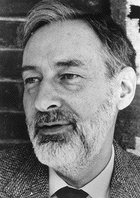Tjalling C. Koopmans, 1910-1986.


A pioneer in the development of mathematical economics and
econometrics, as head of the Cowles
Commission from 1948 until 1967, Koopmans presided over a
crucial period in the development of Neo-Walrasian economics from its roots
in the Lausanne School into its
axiomatized form.
His specific contributions were many: Koopmans independently
discovered and developed the method of "linear programming" and
activity analysis and applied it to practical and theoretical
general equilibrium models (1951, 1957). His Three Essays
(1957) are a classical theoretical and methodological exposition of
Neo-Walrasian general equilibrium theory.
The equivalence of "efficiency in production" and "profit-maximization"
was partly discovered by Koopmans (1951) - thus leading to his effective
involvement in Socialist Calculation debate.
Click here for a review of G.E. which include several
of Koopmans' contributions.
His concern with efficiency in a G.E. setting led him to rewrite the Neoclassical growth model as intertemporal
optimization problems (1965, 1967) and his concern with optimality
over time have been an important phase of his work.
Koopmans was also instrumental in developing and popularizing the
"Cowles Approach" to econometrics (1937, 1947, 1950) -
or simply econometrics as we knew it before the VAR approach became
popular. Koopmans became involved in a Methodenstreit with
the American Institutionalists during
the 1940s over empirical research.
Although of Dutch origin, Koopmans was teaching at Yale when he
shared the Nobel Prize
in 1975 with Leonid Kantorovich.
- Information on Tjalling C. Koopmans
Major works of Tjalling C. Koopmans
- Linear Regression Analysis of Economic Time Series,
1937.
- "The Logic of Econometric Business Cycle Research", 1941,
JPE.
- "Measurement without Theory", 1947, REStat.
- "A Reply to Vining", 1949, REStat.
- "The Econometric Approach to Business Fluctuations", 1949,
AER.
- Editor of Statistical Inference in Dynamic Economic
Models, 1950.
- "Efficient Allocation of Resources", 1951,
Econometrica.
- "A Model of Transportation", with S.Reiter, in Koopmans, 1951.
- "Analysis of Production as an Efficient Combination of
Activities", in Koopmans, 1951.
- Editor of Activity Analysis of Production and
Allocation, 1951.
- "Activity Analysis and Its Applications", 1953, AER.
- Three Essays on the State of Economic Science, 1957.
- "Stationary Ordinal Utility and Impatience", 1960,
Econometrica.
- "Convexity Assumptions, Allocative Efficiency and Competitive
Equilibrium", 1961,JPE.
- "On Flexibility of Future Preferences", 1964 in Bryan and
Shelley, editors, Human Judgements and Optimality.
- "Economic Growth at a Maximal Rate", 1964, QJE.
- "Stationary Utility and Time Preference", with P. Diamond and R.E. Williamson, 1964,
Econometrica.
- "On the Concept of Optimal Economic Growth", 1965,
PASSV
- "On the Concept of Optimal Economic Growth", 1965,
Econometric Approach to Development Planning (reprint
of 1965,PASSV).
- "Intertemporal Distribution and Optimal Aggregate Economic
Growth", 1967, in Fellner, editor, Ten Economic
Studies in the Tradition of Irving Fisher.
- "Objectives, Constraints and Outcomes in Optimal Growth
Models", 1967, Econometrica.
- Scientific Papers of Tjalling C. Koopmans, Volume I,
1970.
- "Representation of Preference Ordering with Independent
Components of Consumption", 1972, in McGuire and Radner,
editors, Decision and Organization.
- "Some Observations on Optimal Economic Growth and Exhaustible
Resources", 1973, in Bos et al, editors, Economic Structure
and Development.
- "Is the Theory of Competitive Equilibrium With It?", 1974,
AER.
- "Proof for a Case where Discounting Advances Doomsday", 1974,
RES.
- "Concepts of Optimality and their Uses: Nobel lecture", 1977, AER.
- "Economics Among the Sciences", 1979, AER.
- "Additively Decomposed Quasiconcave Functions", with G. Debreu, 1982, Mathematical
Programming.
- Scientific Papers of Tjalling C. Koopmans, Volume II,
1985.
Resources on T.C. Koopmans

